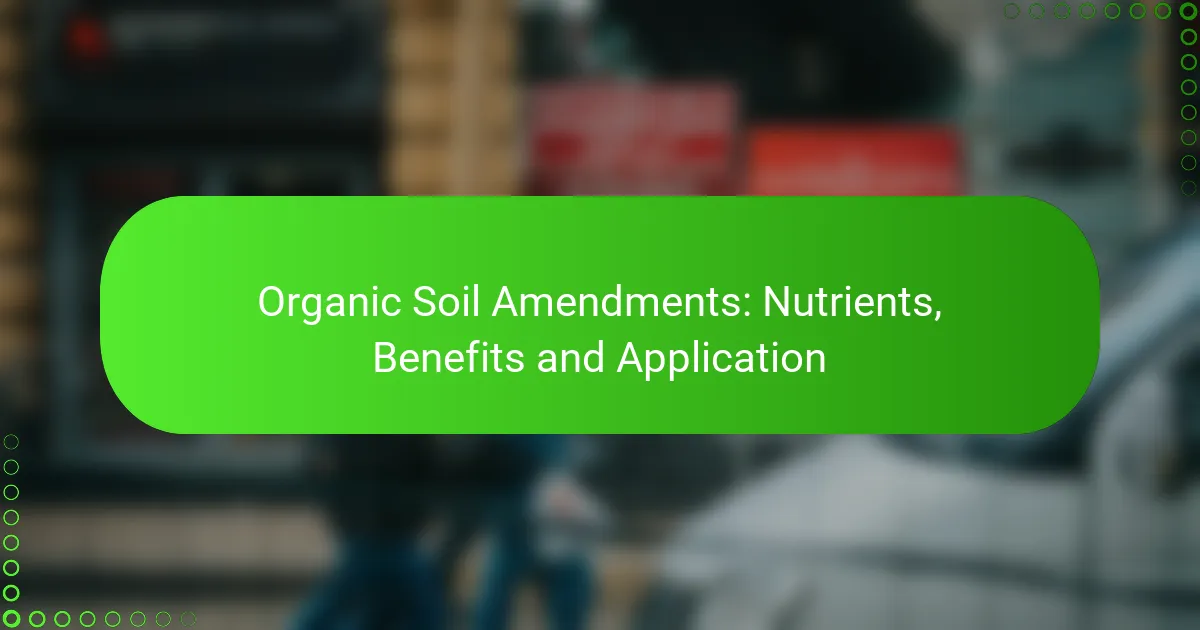Organic soil amendments play a crucial role in enhancing soil health and promoting sustainable gardening practices. By enriching nutrient content, improving soil structure, and fostering beneficial microbial communities, these amendments—such as compost, worm castings, and green manure—support healthy plant growth and resilience. Incorporating organic amendments into your gardening routine can lead to more productive and vibrant gardens.

What are the best organic soil amendments for Australian gardens?
The best organic soil amendments for Australian gardens include compost, worm castings, green manure, bone meal, and seaweed extract. These amendments enhance soil fertility, improve structure, and promote healthy plant growth, making them essential for sustainable gardening practices.
Compost
Compost is a rich organic material created from decomposed plant and animal matter. It improves soil structure, enhances moisture retention, and provides a balanced nutrient supply, making it ideal for Australian gardens.
To create effective compost, combine green materials like grass clippings with brown materials such as dried leaves. Aim for a ratio of about 3:1. Turn the pile regularly to aerate it and speed up decomposition.
Worm castings
Worm castings, or vermicompost, are nutrient-rich pellets produced by earthworms. They contain beneficial microorganisms and essential nutrients, making them an excellent amendment for improving soil health.
To use worm castings, mix them into the soil or apply them as a top dressing around plants. A handful per plant is often sufficient, providing a slow-release nutrient source that supports growth.
Green manure
Green manure refers to cover crops grown specifically to be tilled back into the soil. These plants improve soil fertility, structure, and moisture retention while suppressing weeds.
Common green manure crops in Australia include legumes like clover and vetch, which fix nitrogen in the soil. Plant these crops during the off-season, then till them into the soil before planting your main crops.
Bone meal
Bone meal is a slow-release organic fertilizer made from crushed animal bones, rich in phosphorus and calcium. It promotes strong root development and flowering in plants.
Apply bone meal at planting time, using about 100-200 grams per square meter, depending on the nutrient needs of your plants. Be cautious not to overapply, as excessive phosphorus can harm some plants.
Seaweed extract
Seaweed extract is derived from marine algae and is packed with micronutrients, growth hormones, and trace elements beneficial for plant health. It enhances nutrient uptake and improves plant resilience to stress.
Use seaweed extract as a foliar spray or soil drench, following the manufacturer’s instructions. Regular application can boost growth and improve overall plant vigor, especially in coastal regions of Australia where seaweed is readily available.

How do organic soil amendments improve soil health?
Organic soil amendments enhance soil health by enriching nutrient content, improving physical structure, and fostering beneficial microbial communities. These amendments, such as compost and manure, contribute to a more balanced ecosystem, which supports plant growth and resilience.
Enhance nutrient availability
Organic soil amendments increase nutrient availability by breaking down complex organic matter into simpler forms that plants can absorb. For instance, compost adds essential nutrients like nitrogen, phosphorus, and potassium, which are crucial for plant development.
Incorporating amendments can significantly boost nutrient levels, often resulting in improved crop yields. A common practice is to apply compost at a rate of about 2-5 tons per acre, depending on soil needs and crop type.
Improve soil structure
Organic amendments improve soil structure by increasing aggregation and aeration, which enhances water infiltration and root penetration. This is particularly beneficial in compacted or heavy clay soils, where organic matter helps create spaces for air and water movement.
Regular application of organic materials can lead to a looser, more friable soil texture. This not only supports healthier root systems but also reduces erosion and runoff, promoting sustainable land management.
Increase microbial activity
Organic soil amendments stimulate microbial activity, which is essential for nutrient cycling and soil health. Microorganisms break down organic matter, releasing nutrients in forms that plants can utilize effectively.
Healthy microbial populations can enhance soil fertility and resilience against diseases. To foster this activity, consider applying amendments like compost or well-rotted manure regularly, ensuring they are well-mixed into the soil to maximize contact with microbes.

What are the benefits of using organic soil amendments?
Organic soil amendments offer numerous advantages for enhancing soil health and plant productivity. They improve nutrient availability, promote beneficial microbial activity, and contribute to overall soil structure, leading to healthier plants and more sustainable gardening practices.
Boost plant growth
Organic soil amendments can significantly boost plant growth by providing essential nutrients that are often lacking in conventional soils. Materials such as compost, manure, and green manure release nutrients slowly, ensuring a steady supply for plants over time.
Incorporating organic matter into the soil improves its structure, allowing roots to penetrate more easily and access water and nutrients. This results in stronger, more resilient plants that can better withstand environmental stressors.
Reduce chemical fertilizer use
Using organic soil amendments can lead to a substantial reduction in the need for chemical fertilizers. By enhancing soil fertility naturally, these amendments decrease reliance on synthetic products, which can have negative environmental impacts.
For example, adding compost can provide a balanced nutrient profile, often meeting the needs of plants without the need for additional fertilizers. This not only saves money but also promotes a healthier ecosystem in the garden.
Enhance water retention
Organic soil amendments play a crucial role in enhancing water retention in the soil. Materials like peat moss and well-decomposed compost improve soil structure, allowing it to hold moisture more effectively.
In arid regions or during dry seasons, incorporating organic matter can help maintain soil moisture levels, reducing the frequency of irrigation needed. This is particularly beneficial for sustainable gardening practices, as it conserves water and promotes healthier plant growth.

How to apply organic soil amendments effectively?
To apply organic soil amendments effectively, focus on understanding the specific needs of your soil and plants. This involves selecting the right type of amendment, determining the appropriate application rate, and timing your application to maximize benefits.
Application rates
Application rates for organic soil amendments can vary based on the type of amendment and the specific needs of your soil. A common guideline is to apply 1 to 3 inches of compost or organic matter per year, which can improve soil structure and nutrient content.
For granular amendments like bone meal or blood meal, follow the manufacturer’s recommendations, typically ranging from a few pounds per 100 square feet. Always conduct a soil test to tailor the application rate to your soil’s nutrient levels.
Timing for application
The timing of organic soil amendment application is crucial for maximizing their benefits. Generally, the best time to apply amendments is in the fall or early spring before planting, allowing them to integrate into the soil and release nutrients as plants begin to grow.
Avoid applying organic amendments during periods of heavy rainfall, as this can lead to nutrient runoff. If applying during the growing season, consider side-dressing around established plants to provide a nutrient boost without disturbing their root systems.
Mixing techniques
Mixing organic soil amendments into the soil can enhance their effectiveness. For best results, incorporate amendments into the top 6 to 12 inches of soil using a tiller or garden fork, ensuring even distribution.
When mixing, consider layering amendments if using multiple types, such as combining compost with a nitrogen source like alfalfa meal. This method can create a balanced nutrient profile that supports healthy plant growth.

What are the costs associated with organic soil amendments?
The costs of organic soil amendments can vary significantly based on the type of amendment, quantity needed, and local availability. Generally, investing in organic amendments can enhance soil health and fertility, leading to long-term benefits for crop yields and sustainability.
Average price ranges
Organic soil amendments typically range from a few dollars to over a hundred dollars per ton, depending on the material. Common amendments like compost or well-rotted manure may cost between 20-50 USD per ton, while specialized products like biochar can reach 100 USD or more. Bulk purchases often reduce the price per ton, making it more economical for larger gardens or farms.
In addition to the material costs, consider transportation fees, which can add to the overall expense. Local sourcing can help minimize these costs, so check with nearby suppliers for the best deals.
Cost comparison with synthetic options
When comparing organic soil amendments to synthetic fertilizers, the initial costs of organic options may be higher. However, organic amendments improve soil structure and microbial activity, leading to better nutrient retention and reduced need for additional inputs over time. This can result in lower long-term costs for soil management.
Synthetic fertilizers may appear cheaper upfront, often costing less than 20 USD per bag, but they can lead to soil degradation and require more frequent applications. Weighing the long-term benefits of organic amendments against the short-term savings of synthetic options is crucial for sustainable farming practices.

What factors should be considered when selecting organic soil amendments?
When selecting organic soil amendments, consider factors such as soil type, nutrient needs, and environmental impact. These elements will help determine the most effective amendments to enhance soil health and plant growth.
Soil type
Understanding soil type is crucial when choosing organic soil amendments. Different soils, such as sandy, clay, or loamy, have varying drainage, nutrient retention, and pH levels, which influence how amendments perform.
For sandy soils, amendments like compost or peat moss can improve moisture retention and nutrient availability. In contrast, clay soils may benefit from amendments like gypsum or organic matter to enhance drainage and aeration.
Always conduct a soil test to identify specific nutrient deficiencies and pH levels. This information will guide you in selecting the right organic amendments tailored to your soil’s unique characteristics.










